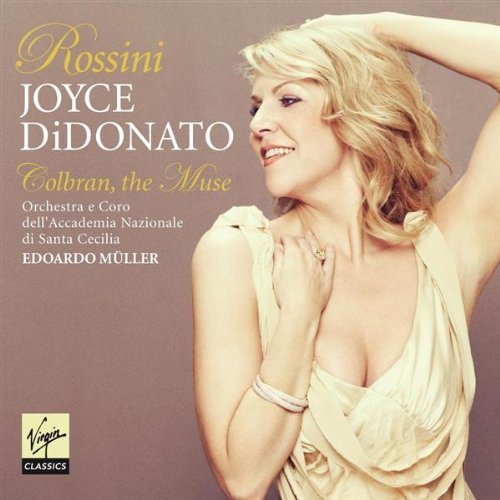Joyce Didonato - Rossini - Colbran The Muse ( Vocal Classical Opera ) @320seeders: 9
leechers: 0
Joyce Didonato - Rossini - Colbran The Muse ( Vocal Classical Opera ) @320 (Size: 164.86 MB)
Description Artist: Joyce Didonato Title Of Album: Rossini - Colbran, the Muse Year Of Release: 2009 Genre: Vocal/Classical/Opera Bitrate: 320 Kbps Total Time: 72:00 min Total Size: 164 MB Tracklist: 01. d'amor al dolce impero - armida 02. oh mattutinit albori! - la donna del lago 03. tanti affetti in tal momento - la donna 04. fra il padre, e fra l'amante - la donna 05. giusto ciel, in tal periglio - maometto ii 06. quant'è frato all'alma mia - elisabetta, 07. serena i vaghi rai - semiramide 08. bel raggio lusinghier - semiramide 09. ah! dagli afanni oppressa - otello 10. nessun maggior dolore - otello 11. oh come infino al core - otello 12. assisa appiè d'un salice - otello 13. deh calma, o ciel, nel sonno - otello 14. se al mie crudel tormento - armida 15. dove son io! - armida 16. È ver...gode quest'anima - armida Mezzo-soprano Joyce DiDonato has been slowly building a major career, and now must certainly be counted among the most important singers of her generation. Unlike many singers who succumb to the temptations of stardom – debuts all over the world in rapid succession, unwise repertoire choices, the churning suffocation of the publicity machine – DiDonato seems to have a good deal of common sense. She has chosen her roles wisely (mainly Rossini, Mozart, and Handel, plus a smattering of others that emphasize lyricism) and recordings have been slow to appear. However, signing a contract with the Virgin label was a big step, and the fruits of this collaboration include her second solo disc and most recent release: Colbran, the Muse, a disc devoted entirely to arias and scenes written by Gioacchino Rossini for his muse, mistress, and eventual wife, Isabella Colbran. In the accompanying booklet, noted Rossini scholar Philip Gossett asks the question that every lover of Rossini's opera seria has mulled over at least once or twice: 'Exactly what kind of voice must Isabella Colbran have had in order to negotiate the fiendishly difficult music written for her by Rossini in the ten roles she created for him?' In an astonishing array of characters, the 'Colbran roles' run the gamut from beguiling and passive (Desdemona, Elicia, Elena) through authoritative yet loving (Elisabetta, Semiramide) to downright vindictive (Ermione, Armida). It may be hard to believe, but contemporary accounts seem to indicate that Colbran was in vocal decline almost from the beginning of her association with Rossini, so if nothing else, she must have been an impressive actress. Since it is now customary to classify singers by vocal range and amplitude (a system much less obsessively employed during Rossini's time), one naturally wonders whether the Colbran roles are better suited to modern mezzo-sopranos or sopranos. The answer is unclear. Over the last half century, sopranos have shouldered the burden of presenting these terrifically interesting operas, but revivals have been few and far between. Famous names such as Callas (Armida), Gencer (Elisabetta), Sutherland (Semiramide), and Caballe (La donna del lago) have contributed to the renaissance of Rossini's serious operas, but even with such star power, none of these operas has become a true staple of the modern operatic repertoire. Thus, this new disc from Ms. DiDonato is especially welcome. She joins other mezzo-sopranos such as Frederica von Stade, Jennifer Larmore, Sonia Ganassi, and Kate Aldrich – all of whom have tackled one or more of the Colbran roles in fully staged productions. In fact, as novel as it may at first seem to have a mezzo-soprano singing this repertoire on disc, all of the selections on Colbran, the Muse have been recorded by other mezzos, with the exception of the final scene from Armida. Nevertheless, DiDonato turns in bravura performances to match the very best in several cases. Taken in sum, the disc is an achievement of outstanding quality. Hardly one to shirk a challenge, DiDonato starts out with the notoriously taxing theme and variations 'D'amor al dolce impero' from Armida. Unfortunately, this selection highlights the potential pitfalls for a mezzo-soprano perhaps more than any other on the disc. DiDonato tears into the opening theme with gusto, but as the vocal line rises and the emotions intensify, the listener becomes aware of a lack of fullness and bloom at the high end of DiDonato's range. Notes from A, b-flat, B to even several high Cs, can ring out with fearsome confidence for a soprano (hear Callas and Fleming), but are at the taxing high end of the mezzo-soprano's natural compass. Thus, even though DiDonato's handling of these phrases is hugely impressive, one does miss a strong soprano sonority here. Though there are a few spots of wayward intonation, her diction is superb, and her ornaments, both intricate and fitting well into the musical phrases, are sung with utter confidence. One simply does not come away convinced of the power behind the sorceress (in contrast with DiDonato's recent Alcina which convinced on every count). Once past the opening showpiece, DiDonato moves from strength to strength, delineating her most successful characterizations in the gentler, more cantabile passages. Her Desdemona is especially satisfying, giving the singer ample opportunity to run through a challenging range of emotions. Likewise, the opening barcarolle from La donna del lago and prayer from Maometto II offer models of long-lined, bel canto singing. DiDonato brings great dignity and flair to the queens Elisabetta and Semiramide, even though she cannot quite muster the requisite imperious quality that one might want from these regal women. Still, her singing here is nearly flawless, exhibiting – again – crystal clear diction, perfect intonation, and amazingly thrilling ornaments. Her closing selection is the wonderfully theatrical final vengence scene from Armida, and she triumphs completely over every vocal challenge, bringing the angry protagonist vividly to life. But the crowning glory of this disc is the rondo finale from La donna del lago in which DiDonato pulls out every stop, tossing off astounding runs, trills, perfectly modulated triplets, and ornaments galore. She even includes a series of back-and-forth staccati between high b-flat and C, finishing with a sterling trill of jaw-dropping quality. Given her success in Elena's scenes, it is exciting to know that DiDonato will assume the entire role next spring. Edoardo Muller's conducting shows ample evidence of his vast experience with bel canto operas, and the Orchestra e Coro dell'Accademia Nazionale di Santa Cecilia – Roma perform as expertly as one could wish. The supporting singers, while it's a bonus to include their brief contributions, are no more than adequate, excepting tenor Lawrence Brownlee who offers a beautiful rendition of the Gondolier's song in Otello. In sum then, this is a superior disc of repertoire vital to an understanding of Rossini's operatic legacy, and it belongs in every bel canto collection. DiDonato is on winning form throughout, and one hopes that she will continue exploring in this vein: there are more than enough remaining Colbran arias to fill at least one more disc – perhaps two. By David Laviska  And many similar posts in H33T & KAT, all active and seedeed. http://kickasstorrents.ee/user/radio957/uploads/ http://h33t.to/member/radio+957 DONT BE SEL  SEED FOR YOUR FRIENDS! Sharing Widget |